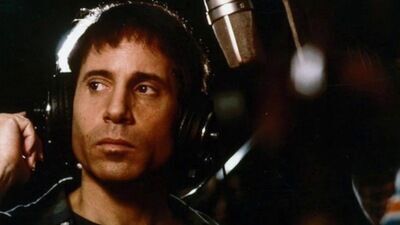“I didn’t want to do a film about music that I couldn’t believe in,” Simon explained later. “That’s the biggest problem I found with other [rock-related] films. They seemed false. Take [the 1976 version of] ‘A Star Is Born.’ It didn’t seem like a rock film to me. … You don’t really believe Barbra Streisand is a rock star. You always know it’s really Barbra Streisand.” The idea of having Dreyfuss, or anyone else, lip-synch to his vocals just seemed silly to him.
Simon was in a position where he could make such decisions. Even though he didn’t direct “One-Trick Pony,” he did have final cut (according to the 1980 Rolling Stone profile). And he got to choose the director, which meant that certain filmmakers balked at his invitation, figuring they wouldn’t be calling the shots on set. “I remember having a conversation with Alan Parker,” Simon told Marsh. “He said, ‘What would I do here? You wrote it, you’re starring in it, and you wrote the music. I don’t want to be a yes man. What would my role be?’ A lot of people, I think, had that feeling.” Ultimately, Simon went with Robert M. Young, who died last month at the age of 99. “His ego didn’t get in the way,” Simon suggested. “He saw room for him to function as a director and be of help to the movie and still feel that he was, you know, in charge.”
Up to that point, Young had worked mostly on independent films, like 1977’s “Alambrista!,” which chronicled a Mexican farmer (Domingo Ambriz) trying to cross the border into America in order to secure a better life for his family. By comparison, “One-Trick Pony” was a more mainstream project, even if it did somewhat reflect the New Hollywood era in its lament for an outsider facing off with an unfeeling society. And Simon took his lead role seriously, even working with an acting coach to play this unhappy artist who, ultimately, must decide whether he’ll allow his personal, rock-oriented songs to be corrupted by a shallow music exec (Rip Torn) and the flashy producer (Lou Reed, of all people) who are only concerned about getting Jonah on pop radio.
The late 1970s was a prolific, if uneven, period for rock movies. You had acclaimed concert films such as “The Last Waltz” alongside disasters of varying degrees like “Sgt. Pepper’s Lonely Hearts Club Band” (a jukebox musical that featured Beatles songs but not the Beatles) and “Renaldo and Clara” (Bob Dylan’s spacey, nearly-four-hour melodrama that he wrote, directed and starred in). The same year as “One-Trick Pony” came out, Hollywood released cheesy musical (or music-adjacent) opuses like “Xanadu” and “Flash Gordon.” Simon’s old partner Art Garfunkel had made the leap to acting—he’s terrific in 1971’s “Carnal Knowledge”—but Simon didn’t have much on-camera experience. And unlike “Purple Rain,” which would open a few years later, “One-Trick Pony” wasn’t meant to catapult a rising star into the stratosphere—and use a semi-autobiographical storyline to achieve it. This was music icon Paul Simon playing a guy who most definitely wasn’t Paul Simon. And yet there was something about Jonah’s disappointing career that Simon envied.

